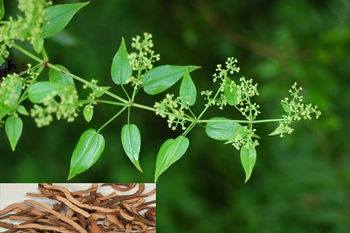Rubia Cordifolia
From Wikiwel
(Redirected from Manjistha)
Other Names : Indian Madder, Marathi, Majith, Tamaralli, Manditti, btsod, qiàn cǎo gēn (茜草根), Qiancao, btsod, བཙོད་
The roots of Rubia cordifolia are used in Ayurveda.
See also : Qiàn Cǎo Gēn (TCM)
Contents
Special Precautions of Rubia Cordifolia
- High Vāta; Can aggravate vata in long term.
- Caution with Deficiency Cold in the SP & ST, diminished blood, & Yin Deficiency Fire.
- Do not use long term. (Potential mutagen)
Chemical Composition
Purpurin, purpuroxanthin, alizarin, munjistin, pseudopurpurin, physcion, quinizarin, rubian, rubimaillin
Benefits and uses of Rubia Cordifolia are
The roots of Rubia cordifolia are also the source of a medicine used in Ayurveda, this is commonly known in Ayurvedic Sanskrit as Manjistha (or Manjista or Manjishta) and the commercial product in Hindi as Manjith. It is one of Ayurveda's most popular blood purifiers that has been used for lymphatic support.
- used to treat blood disorders; spread heat, excess heat in the lungs, kidneys, and intestines; reduce swelling; and is a component of the three reds, a subcompound included in many Tibetan preparations in order to remove excess heat in the blood.
- Hemostatic: marked effectiveness in reducing bleeding time in rabbits; duration of action was 2 to 48 hours when given orally, and 30 to 60 minutes when given via intraperitoneal injection; charred herb was more effective than fresh herb
- as an immune regulator. Scientific studies have shown that it regulates blood pressure, blood vessel constriction, and helps prohibit blood clot formation.
- to treat raised uric acid, arthritis associated with gout, glandular swellings, reoccurring skin infections and other skin diseases such as pigmentation anomalies and leucoderma.
- Kidney stones: a diet regimen containing 20% Qian Cao showed promise in preventing or minimizing the formation of kidney stones in mice
- It works in conjunction with other products in treating uterine and urinary infections, diarrhea, dysentery, and chronic fevers.
- Manjistha can be used to treat irregular menstruation.
- This herb works very well both internally and externally to promote skin glow and lustre. It also helps remove pimples, freckles, other discolorations, and promotes the healing of skin tissues damaged by injury or infection.
- It is known as btsod (Tibetan: བཙོད་) in Traditional Tibetan Medicine where it is used to treat blood disorders; spread heat (Tibetan: འགྲམས་ཚད་), excess heat in the lungs, kidneys, and intestines; reduce swelling; and is a component of the three reds (Tibetan: དམར་གསུམ་), a subcompound included in many Tibetan preparations in order to remove excess heat in the blood.
- In Traditional Chinese Medicine it is known as qiàn cǎo gēn (茜草根).
- Antibiotic: inhibitory effect against S. aureus, Diplococcus pneumoniae, and dermatophytes
- Antitussive and expectorant: water extract administered orally to mice at 75 g/kg demonstrated marked antitussive and expectorant effects; alcohol extract had no such effect
- Antispasmodic: water extract administered orally to rabbits relaxes the smooth muscle of the intestines to treat intestinal spasms and cramps
- Immunostimulant: associated with 151.9% rise in white blood cell count, compared to a placebo, in mice and dogs
References
- R. Daman, S. Bhandari, B. Singh and Brij Lal; S. Pathania (2006). "Comparative Studies of Rubia cordifolia L. and its Commercial Samples". Ethnobotanical Leaflets (11): 179–188.
- Gyatso, Thinley; Hakim, Chris (2010). Essentials of Tibetan traditional medicine. Berkeley, Calif.: North Atlantic Books. p. 167. ISBN 978-1-55643-867-7.
- Joshan Rani S., Nagarauk R., Anuradha P. "Antibacterial properties of extracts of Indian medicinal plants: Syzygium alternifolium, phyllanthus niruri and rubia cordifolia" Biomedical and Pharmacology Journal 2010 3:1 (123-128)
- Divakar K., Pawar A.T., Chandrasekhar S.B., Dighe S.B., Divakar G."Protective effect of the hydro-alcoholic extract of Rubia cordifolia roots against ethylene glycol induced urolithiasis in rats" Food and Chemical Toxicology 2010 48:4 (1013-1018)
